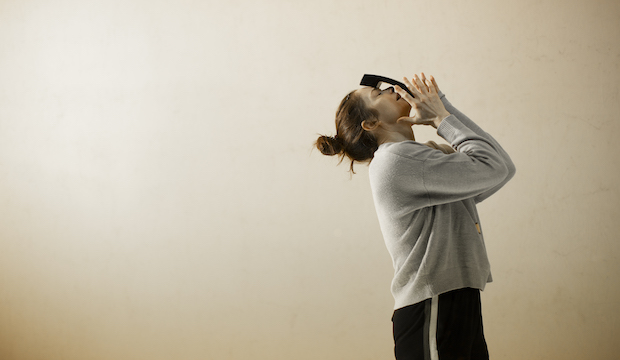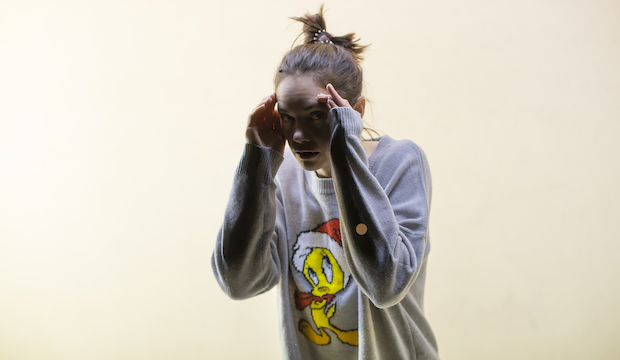The Human Voice, Harold Pinter Theatre review ★★★★★
Ivo van Hove and Ruth Wilson reunite to bring Jean Cocteau’s The Human Voice to the Harold Pinter Theatre
Ruth Wilson in The Human Voice. Photo: Jan Versweyveld
‘This phone is the only thing that still connects us,’ whines Ruth Wilson in The Human Voice. The phone is also the only thing tethering the audience to the narrative of pioneering surrealist and avant-gardist Jean Cocteau’s 1930 play, which takes the form of a one-sided phone call between a woman, She, and her former lover. This production, booked for a limited three-week run at the Harold Pinter Theatre, reunites the Olivier-winning actress with experimental Belgian director Ivo van Hove (All About Eve, A View from the Bridge), whose 2016 production of Hedda Gabler at the National Theatre she starred in. It’s a slick, minimalist take on the monodrama, and while appropriately uncomfortable to watch in places, ultimately makes for unmoving viewing.
After battling with crossed telephone lines (a plot hurdle likely to bemuse younger audience members), She finally makes contact with her partner of five years. A stream of intimacies initially sets the pretence that we’re witnessing one side of a yearned-for, long-distance relationship, but the chit-chat and purrs of ‘darling’ soon give way to talk of collecting letters and coping. Uh-oh, this is in fact a break-up; one that has left She heartbroken and dependent, while her voiceless lover has moved on.

Ruth Wilson in The Human Voice. Photo: Jan Versweyveld
An uncomfortable disconnect between what She says and feels underlies the narrative from start to finish. ‘If you didn’t love me this phone would become a horrible weapon’, She laughs, unconvincingly, in one of many bouts of bravado that seemingly stem from her ex’s patronising pleas for her to stay positive. When not clinging to the phone, She pulls us into the chaos of her mind, and we watch her scream silently, pace the stage or crumble to the floor.
The Human Voice is a carefully formulated play; both the balcony and blue dress that frame the final scene earn their places having been fed into earlier moments in the narrative.
The problem is, the 90-minute play doesn’t develop or shift in perspective (that is, until its final moment, which coincides with lights out). The formulaic phone calls continue and in one gruelling scene, She lies slumped against the back wall, her face pressed against it, for what feels like minutes while David Gregory’s soundscape of sorrowful cello music reinforces her sense of loss. Another scene is soundtracked by Beyoncé’s Single Ladies spliced with a slower, more wistful song, and while this could portray the emotional hurricane of moods experienced during a break-up, nothing in van Hove’s direction of Wilson supports this.

Ruth Wilson in The Human Voice. Photo: Jan Versweyveld
While She lingers in a state of mental turmoil, time is dragged forward by Jan Versweyveld’s set design, which employs the help of assistant lighting designer Martijn Smolders to create a sun-like reflection on the back wall of She’s box-like flat. A second wall, made of glass, stands between Wilson and her audience, and is used to dramatic effect, with the jilted lover vomiting down it or smashing her head against it in moments of intense anguish.
While let down by here by some uninspiring direction, Wilson – who TV audiences may know from her performances in His Dark Materials, Luther and Jane Eyre among other titles – delivers an impressive, naturalistic performance as She, flitting eerily between her positive phone face and moments of mental unravelling. This switch is most stark in an early scene, where we watch her cheery demeanour shatter as she detaches herself from the phone to cradle a pair of her ex-lover’s shoes.
A scattering of further moments like this are equally harrowing, but even so, Wilson alone can’t lift van Hove’s production to the dizzying heights we leave her teetering on at the end.
After battling with crossed telephone lines (a plot hurdle likely to bemuse younger audience members), She finally makes contact with her partner of five years. A stream of intimacies initially sets the pretence that we’re witnessing one side of a yearned-for, long-distance relationship, but the chit-chat and purrs of ‘darling’ soon give way to talk of collecting letters and coping. Uh-oh, this is in fact a break-up; one that has left She heartbroken and dependent, while her voiceless lover has moved on.

Ruth Wilson in The Human Voice. Photo: Jan Versweyveld
An uncomfortable disconnect between what She says and feels underlies the narrative from start to finish. ‘If you didn’t love me this phone would become a horrible weapon’, She laughs, unconvincingly, in one of many bouts of bravado that seemingly stem from her ex’s patronising pleas for her to stay positive. When not clinging to the phone, She pulls us into the chaos of her mind, and we watch her scream silently, pace the stage or crumble to the floor.
The Human Voice is a carefully formulated play; both the balcony and blue dress that frame the final scene earn their places having been fed into earlier moments in the narrative.
The problem is, the 90-minute play doesn’t develop or shift in perspective (that is, until its final moment, which coincides with lights out). The formulaic phone calls continue and in one gruelling scene, She lies slumped against the back wall, her face pressed against it, for what feels like minutes while David Gregory’s soundscape of sorrowful cello music reinforces her sense of loss. Another scene is soundtracked by Beyoncé’s Single Ladies spliced with a slower, more wistful song, and while this could portray the emotional hurricane of moods experienced during a break-up, nothing in van Hove’s direction of Wilson supports this.

Ruth Wilson in The Human Voice. Photo: Jan Versweyveld
While She lingers in a state of mental turmoil, time is dragged forward by Jan Versweyveld’s set design, which employs the help of assistant lighting designer Martijn Smolders to create a sun-like reflection on the back wall of She’s box-like flat. A second wall, made of glass, stands between Wilson and her audience, and is used to dramatic effect, with the jilted lover vomiting down it or smashing her head against it in moments of intense anguish.
While let down by here by some uninspiring direction, Wilson – who TV audiences may know from her performances in His Dark Materials, Luther and Jane Eyre among other titles – delivers an impressive, naturalistic performance as She, flitting eerily between her positive phone face and moments of mental unravelling. This switch is most stark in an early scene, where we watch her cheery demeanour shatter as she detaches herself from the phone to cradle a pair of her ex-lover’s shoes.
A scattering of further moments like this are equally harrowing, but even so, Wilson alone can’t lift van Hove’s production to the dizzying heights we leave her teetering on at the end.
TRY CULTURE WHISPER
Receive free tickets & insider tips to unlock the best of London — direct to your inbox
| What | The Human Voice, Harold Pinter Theatre review |
| Where | Harold Pinter Theatre, Panton Street, London, SW1Y 4DN | MAP |
| Nearest tube | Piccadilly Circus (underground) |
| When |
17 Mar 22 – 09 Apr 22, Performance times vary |
| Price | £18+ |
| Website | Click here for more information and to book |